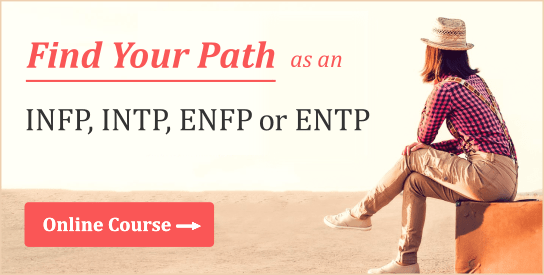In Part 1 of this post, we explored how doubt can disrupt INFPs’ ability to find and commit to a life path. This can leave them frustrated and disheartened, when even their best laid plans are undermined by doubt and uncertainty.
We also discussed how doubt reflects the tension between having limitless possibilities, on the one hand, and a path of purposeful action, on the other. The former represents the interests of INFPs’ auxiliary function, Extraverted Intuition (Ne), the latter their desire for intensive Introverted investment.
Fortunately, the way forward for INFPs needn’t take the form of an either-or decision. While committing to a path may limit INFPs options in some respects, there’s usually still plenty of room for exploration along the way. Just as walking in a specific direction doesn’t preclude sightseeing or side trips, choosing a path needn’t signify the end of exploration. A directed life can be just as rich with possibilities and adventures as an open-ended one.
Of course, not all paths are created equal for INFPs. Even though there’s ample wiggle room to be found (or carved out) in most career fields, some are more congenial to INFPs’ needs than others. INFPs generally require a lot of autonomy, flexibility, and variety in their lives and work. Work that incentivizes creativity rather than firm adherence to rules and routines is also preferred.
Many INFPs see creative work as carrying the promise of everything they’re looking for. For one thing, acting creatively doesn’t require that they know themselves perfectly in advance. Rather self-discovery and creative development can unfold together in symbiotic fashion. In the words of Enneagram author Don Riso:
In the creative moment, they… not only produce something beautiful, but discover who they are.
Creatively-inclined INFPs are driven by the fundamental insight that they’re at their best when they’re creating. Much of this stems from the pleasure of the flow experience. Creative flow allows INFPs to “lose themselves”—to become so deeply immersed in the process that anxious self-consciousness drops away—while at the same time “finding themselves” (i.e., feeling purposefully engaged and competent). Flow is a welcomed reprieve from the doubts and worries that frequently plague INFPs. It’s only natural that those who see creativity as a sort of “oasis in the desert” would want to build their lives and identity around creative pursuits.
Also important is INFPs’ realization that opportunities for growth, learning, and discovery in the creative life are infinite. It’s therefore unsurprising that many INFPs find the creative life path deeply alluring.
There are a number of potential downsides associated with taking the creative path, however. While it clearly carries much promise for INFPs, where there is opportunity for great rewards, there’s also great risk. This can come in many forms, be it financial, social, psychoemotional, or otherwise. So even though creative work can satisfy INFPs’ desire for both limitless possibilities and purposeful action, its perceived risks may, for some, tip the scales in a different direction.
Weighing Fears & Values
Ultimately, one might suspect INFPs to choose a life path concordant with their most foundational or supreme value(s). After all, their dominant function, Introverted Feeling (Fi), takes great interest in discerning and authentically living out their core values.
But due to doubts and uncertainties surrounding life’s big decisions, it can be difficult for INFPs to determine which values are authentic and which are being driven or amplified by fear. They might ask themselves, for instance, whether fear is pushing them toward a “safer” path or whether safety is in fact a high priority.
Interestingly, while we might expect more turbulent INFPs to opt for safer routes in order to right their emotional ship, it’s these same INFPs that are often drawn to creative pursuits. And since the creative road is invariably rocky, such INFPs are particularly apt to struggle with doubt. On the one hand, they may feel their spiritual livelihood is rooted in their creative work and should therefore be prioritized above all else. But taking steps of commitment in this direction can trigger all sorts of fears and doubts, including waves of self-doubt. Safer alternatives are thus granted readmission into the conversation and deliberations are resumed.
Finding one’s rightful path requires examining and weighing one’s values as well as fears. It’s a process of sorting through which are worth heeding and which are not. Because fear often operates surreptitiously, behind the scenes of consciousness, trusting the most prominent voice in a given moment doesn’t guarantee the best outcome. It’s usually advisable for INFPs to survey a broader swath of their hopes, dreams, and life experiences to discern what really matters to them. Learn more about what this process might look like for INFPs in our online course:
Finding Your Path as an INFP, INTP, ENFP or ENTP
